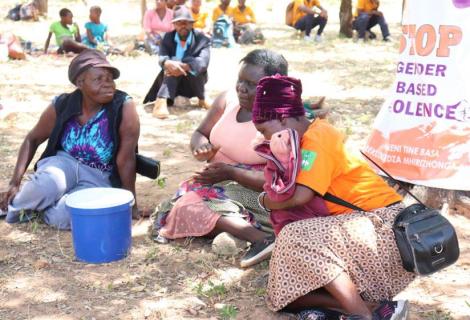SASA TOGETHER, JUST WHAT THE DOCTOR PRESCRIBED

In Nyanga, Nyaradzai Bhaera holds deeper discussions with fellow women in her village dissecting bedroom issues ranging from issues of consent, respect for one another amongst others. She is quite aware that deeper discussions held with a small group of women bring to the attention issues that are rarely talked about and very few are willing to open up for such discussions.
Fortunately, her training in May 2023 as a SASA champion helped her to hold and steer conversations with so much ease. Smiling all the way during the interview and showing signs of confidence, Nyaradzai reveals how SASA sessions have helped her community.
“Through SASA, cases of Gender Based violence have been reduced in my community. A day would not pass without word going around about a certain couple that had fought or a broken marriage. Openly discussing these issues has helped. Perpetrators now understand why it is wrong to beat someone while survivors get an opportunity to heal.”
At every given opportunity, Nyaradzai holds sessions with individuals and groups within her community. Whenever she leaves her home, whether attending a funeral, visiting friends or attending community events, Nyaradzai ensures that she carries her educational material.
“When I became a SASA Champion I told myself that mine is a 24 hour job. I therefore do not plan on when and where I should hold sessions. My sessions can happen anywhere. A lot of discussions happen at family level, funerals and community meetings. I am always prepared to hold sessions whenever I leave home.”
Sekai Zhwuaki, another SASA Champion from Chikundi Village in Nyanga speaks positively about SASA. Sekai is a former Rural Women Assembly Chairperson and the current village head. In her village, Sekai and other women decided to set up a community garden so that women in the village can easily meet discussing various issues while at the same time creating an opportunity for income generation through the garden project. They have not only done that, they have set up a Incomes Savings and Lending Scheme (ISALS) meant to create more income opportunities for women in her community.
“The issue of violence and income is closely related. Lack of income sometimes ignites violence in some homes. This is the reason why we have set up an incomes and savings group on top of the discussions we have.”
As though that is not enough, she has gone all the way setting up a netball team, so that women in her village can entertain themselves out of their daily schedules.
“Netball tournaments are becoming popular in my ward. Instead of just providing entertainment, we hold SASA sessions before games are played. This is meant to increase awareness given the number of people who attend sessions.”
Audrey Mudhanda, a young woman attending SASA sessions facilitated by Sekai, spoke positively about the sessions.
“We never used to talk openly about gender-based violence. I am happy because i now know where to report gender-based violence cases and how to assist my friends if they encounter violence.”
Vimbai Manhera, who also attends SASA sessions in ward 6 is equally happy.
“Our husbands used to say that we are wasting time attending incomes groups and SASA sessions. I am happy now that we have seen the change. They have seen us performing community dramas and attended ball games where we talk about gender-based violence. We are also contributing to family income through our savings groups. Most men in our communities have changed. Cases of violence are now very low.”
In Shamva, Rose Mwenyeali (39) a SASA champion lived a life of abuse for many years. Due to the lack of knowledge on how to handle such situations she was forced to suffer in silence but not anymore.
“I used to be in an abusive relationship, but after the introduction of this SASA program, I now know the referral pathways if I am experiencing GBV and get assistance,” said Rose appreciating the change brought about by SASA in her community.
Mitchel Nyanhi,(22) from Chitungwiza Unit L, Ward 18 who was well known for violence against girls found redemption and purpose through the SASA program. Mitchel’s life took a turn when he encountered a group of SASA members conducting outreach in his community. Their message of empowerment and accountability struck a chord with Mitchel, prompting him to reflect on the consequences of his actions and the harm inflicted upon others. Through engaging conversations and educational sessions facilitated by the SASA program, Mitchel gained invaluable insights into the root causes of violence against girls and the ripple effects on individuals, families, and communities.
“I was assisted by this SASA program because I used to be violent to girls. I used to physically assault girls in the street, if I approached a girl and they ignore me or refused to talk to me,” said Mitchel.